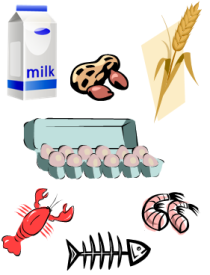Food Allergy
Food allergy occurs when the immune system mistakenly attacks a food protein. Ingestion of the offending food may trigger the sudden release of chemicals, including histamine, resulting in symptoms of an allergic reaction. Scientists estimate that approximately 12 million Americans suffer from food allergies.
People with food allergies may have severe and possibly life-threatening reactions if they eat those foods. The most common triggers are the proteins in cow's milk, eggs, peanuts, wheat, soy, fish, shellfish and tree nuts.
Food, medications, insect stings and exposure to latex can trigger anaphylaxis. Anaphylaxis (pronounced an-a-fi-LAK-sis) is a serious allergic reaction that comes on quickly, causing mild to severe symptoms that affect various parts of the body.
Symptoms of anaphylaxis include a feeling of warmth, flushing, tingling in the mouth or a red, itchy rash. Other symptoms may include feelings of light-headedness, shortness of breath, throat tightness, anxiety, pain/cramps and/or vomiting and diarrhea. In severe cases, you may experience a drop in blood pressure that results in a loss of consciousness and shock. Without immediate treatment with an injection of epinephrine (adrenalin), anaphylaxis may be fatal.
What is cross-reactivity?
Cross-reactivity is the occurrence of allergic reactions to foods that are chemically or otherwise related to foods known to cause allergy in an individual. If someone has a life-threatening reaction to a certain food, the doctor will counsel that patient to avoid related foods, which also might induce the same reaction. For example, if a person has a history of a severe allergy to shrimp, he or she can also possibly be allergic to crab, lobster, and crayfish.
What is oral allergy syndrome?
The oral allergy syndrome is another type of cross-reactivity. This syndrome occurs in people who are highly sensitive, for example, to ragweed or birch pollen. During the seasons that these allergens pollinate, the affected individual may find that when he or she tries to eat fruits, chiefly melons and apples, a rapid onset of itching is experienced in the mouth and throat, and the fruit cannot be eaten. The oral allergy syndrome is also known as or pollen-food allergy syndrome and is thought to be a type of contact allergy related to the presence of proteins in certain foods that cross react with allergy-causing pollen proteins. Oral allergy syndrome occurs in up to 50% of those who have allergic rhinitis caused by pollen. Symptoms are immediate upon ingestion of fresh or uncooked foods and include the itching, irritation, and mild swelling of the lips, tongue, palate, and throat. Cooked fruits and vegetables usually do not cause the reaction. The symptoms usually go away within minutes, although up to 10% of people will develop systemic (body-wide) symptoms, and a small number (1%-2%) may experience anaphylactic shock. Tree nuts and peanuts tend to cause more severe reactions than other foods.
Source: MedicineNet, The Food Allergy & Anaphylaxis Network






